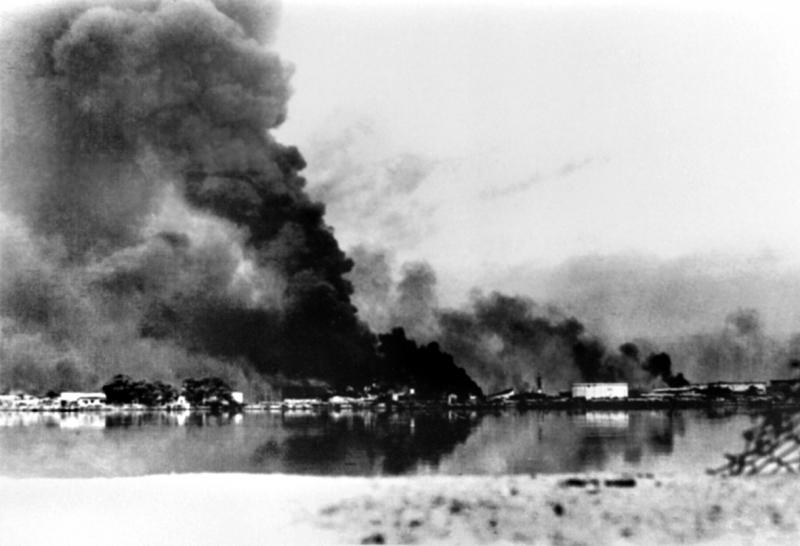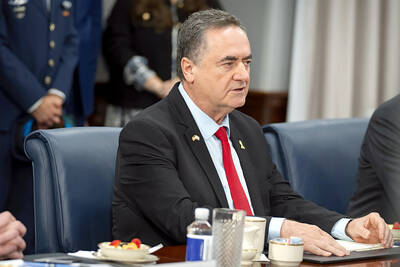Thirty-three years have passed, but the survivors of an Iraqi poison gas attack on the Iranian town of Sardasht still suffer — and fight for international recognition of the horrific massacre.
“If someone lost a leg or an arm in the war, you can put a prosthesis on him,” said Saleh Azizpour, who heads an association for victims of the attack. “But when our lungs are burned, who will breathe for us?”
Tehran on Monday commemorated 40 years since former Iraqi president Saddam Hussein attacked Iran, launching a war that raged for eight years.

Photo: AFP
Iraq’s June 28, 1987, gas attack on Sardasht, a Kurdish town in northwestern Iran, is considered to be the first time chemical weapons deliberately targeted civilians in an urban area.
“The dead and wounded range from a three-month-old to a 70-year-old man,” Azizpour said. “All were civilians.”
The official toll is 119 dead and 1,518 wounded, but Azizpour, who was 25 in 1987, said that many more were affected.
About 8,000 people were exposed to what experts have said was mustard gas and many who survived are struggling with long-term health complications.
“Even today, there is sometimes so much pressure on my lungs ... that I cannot sleep,” 50-year-old teacher Mahmoud Assadpour said.
The effects of COVID-19, which has hit Iran hard, is a threat to survivors, said physician Rojane Qaderi, who heads the Sardasht Public Health Network.
“As their immune system is weak ... their chances of survival are low,” Qaderi said.
Survivors of the attack are asked to stay in their homes for protection against the virus.
“We are at home. We do not go out. It is as if we are in a cage,” said Mohammad Zamani, 59, who remembers hearing “muffled bangs” as the gas canisters dropped.
His wife, Leila Marouf Zadeh, was a volunteer nurse.
She recalls cries of the wounded at the field hospital begging for help — many who she knew.
The skin of some victims turned red from burns from the incapacitating gas.
“Some had crimson breasts, others, their whole bodies,” she said.
However, after a few hours of helping the survivors, she also felt the stinging effect.
The gas had blinded her temporarily.
Retired farmer Rassoul Malahi, who uses an artificial respirator to breathe, tells a similar story.
He was left “totally blind” for 18 days.
“The consequences of mustard gas are permanent,” Qaderi said. “It affects or destroys the lungs. You have to learn to live with it.”
The list of symptoms include sore and swollen eyes, red and itching skin, as well as shortness of breath, difficulty in moving and exhaustion, she said.
Now there is an extra problem.
Since the US reimposed crippling sanctions against Iran in 2018, it has been difficult to find the drugs needed for survivors.
Saddam Hussein began using chemical weapons against Iran as early as 1982.
However, it took the UN Security Council until 1986 to deplore the “use of chemical weapons” in the conflict. Even then, it avoided singling Iraq out specifically for blame.
Survivors have said that the feeble response from the international community was tantamount to complicity in the attack.
The survivors campaign for international recognition of what happened in Sardasht.
They want the town to become a “symbol” — like Hiroshima has been since its destruction by a US atomic bomb — that provides a warning to ensure “it does not happen again.”

STEPPING UP: Diminished US polar science presence mean opportunities for the UK and other countries, although China or Russia might also fill that gap, a researcher said The UK’s flagship polar research vessel is to head to Antarctica next week to help advance dozens of climate change-linked science projects, as Western nations spearhead studies there while the US withdraws. The RRS Sir David Attenborough, a state-of-the-art ship named after the renowned British naturalist, would aid research on everything from “hunting underwater tsunamis” to tracking glacier melt and whale populations. Operated by the British Antarctic Survey (BAS), the country’s polar research institute, the 15,000-tonne icebreaker — boasting a helipad, and various laboratories and gadgetry — is pivotal to the UK’s efforts to assess climate change’s impact there. “The saying goes

Police in China detained dozens of pastors of one of its largest underground churches over the weekend, a church spokesperson and relatives said, in the biggest crackdown on Christians since 2018. The detentions, which come amid renewed China-US tensions after Beijing dramatically expanded rare earth export controls last week, drew condemnation from US Secretary of State Marco Rubio, who on Sunday called for the immediate release of the pastors. Pastor Jin Mingri (金明日), founder of Zion Church, an unofficial “house church” not sanctioned by the Chinese government, was detained at his home in the southern city of Beihai on Friday evening, said

TICKING CLOCK: A path to a budget agreement was still possible, the president’s office said, as a debate on reversing an increase of the pension age carries on French President Emmanuel Macron yesterday was racing to find a new prime minister within a two-day deadline after the resignation of outgoing French Prime Minister Sebastien Lecornu tipped the country deeper into political crisis. The presidency late on Wednesday said that Macron would name a new prime minister within 48 hours, indicating that the appointment would come by this evening at the latest. Lecornu told French television in an interview that he expected a new prime minister to be named — rather than early legislative elections or Macron’s resignation — to resolve the crisis. The developments were the latest twists in three tumultuous

FIRST STAGE: Hamas has agreed to release 48 Israeli hostages in exchange for 250 ‘national security prisoners’ as well as 1,700 Gazans, but has resisted calls to disarm Israel plans to destroy what remains of Hamas’ network of tunnels under Gaza, working with US approval after its hostages are freed, it said yesterday. Israeli Minister of Defense Israel Katz said that the operation would be conducted under an “international mechanism” led by the US. “Israel’s great challenge after the hostage release phase will be the destruction of all Hamas terrorist tunnels in Gaza,” Katz said. “I have ordered the army to prepare to carry out this mission,” he added. Hamas operates a network of tunnels under Gaza, allowing its fighters to operate out of sight of Israeli reconnaissance. Some have passed under